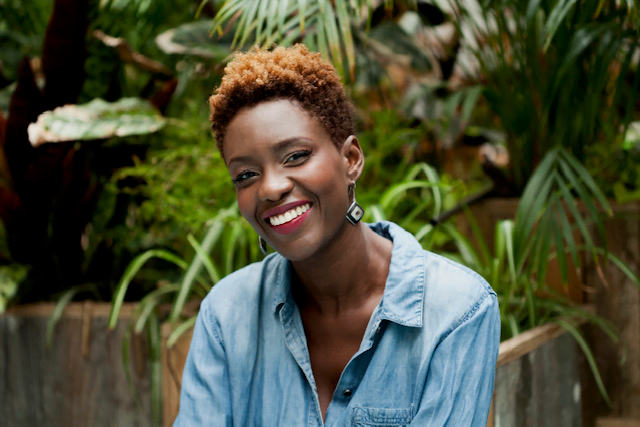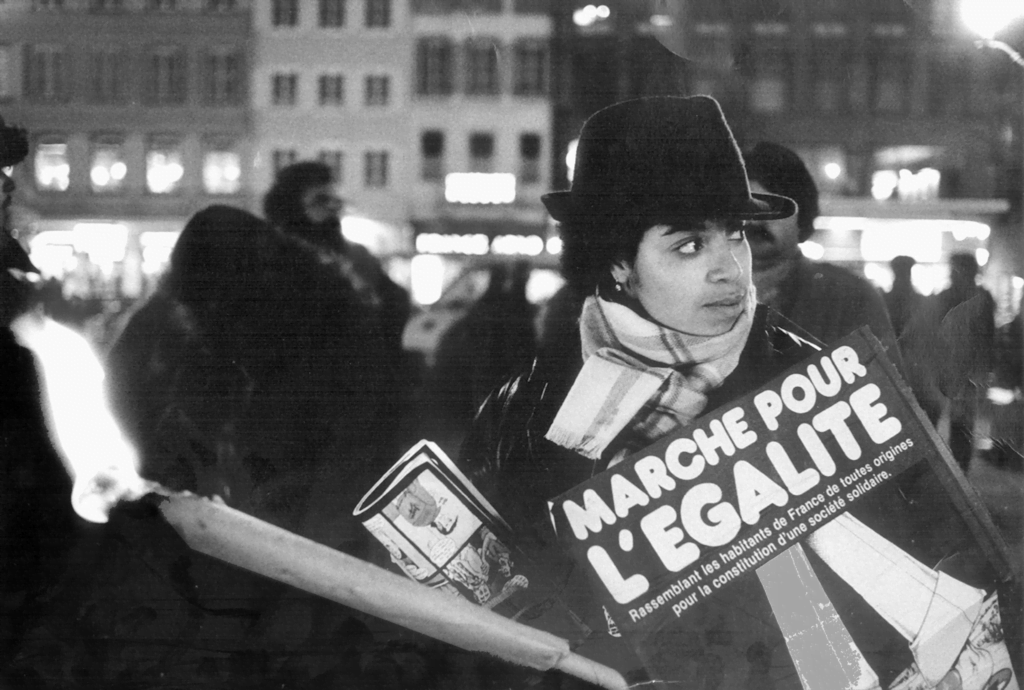Rokhaya Diallo : “March for Equality, celebrating our elders, bringing generations together”
To mark the fortieth anniversary of the March for Equality and Against Racism in France, journalist, filmmaker and essayist Rokhaya Diallo has created a series of events at the Centre Pompidou in Paris from November 10 to 12. Interview with Rokhaya Diallo.

Interview by Mérième Alaoui, in Paris
Twelve young children of immigrants set off from Marseilles on October 15, 1983 on a pacifist march to denounce racist crimes, triggered by yet another police blunder. They were welcomed in Paris on December 3, 1983 by a demonstration of over 100,000 people, before being received by French President François Mitterrand. This triggered new rights for immigrants.
The March for Equality and Against Racism, renamed the « March of the Beurs » by the media, is 40 years old this year. But while it is regarded as « the May 68 of the children of immigrants », it is still struggling « to leave its mark on our collective memory », laments Rokhaya Diallo. At the suggestion of the indefatigable Franco-Senegalese journalist and filmmaker, the Centre Pompidou in Paris is bringing together actors, witnesses, researchers and artists to look back on this political event over three dedicated days.
What stage has the struggle reached? What dialogue is there between the pioneers and the younger generations? A series of debates and conferences that is first and foremost a commemorative event to give shape to « the hope that memory will help us face the challenges of the present », explains Rokhaya Diallo. The event resonates sadly with recent events in France, which saw an outbreak of revolt following the death of 17-year-old Nahel Merzouk at a police check.
Rokhaya, why did you initiate this series of conferences around the anniversary of the March for Equality and Against Racism?
In 2022, I contacted Mathieu Potte-Bonneville (philosopher and director of the Culture and Creation Department at the Centre Pompidou), whom I had met a few weeks earlier when I was talking about Alice Diop’s film « Nous » at the Centre Pompidou. He was very open to the idea of commemorating the 40th anniversary of the March. We came up with a program that would cover all aspects of the event: the commitment on the ground, the presence of women, police violence, the media, anti-racist mobilization, and at the same time try to create an intergenerational dialogue. It’s a subject I’ve been interested in for a long time, ever since I made my first documentary, Freedom Marches, about the parallels between the March on Washington, led by Martin Luther King, among others, and the March for Equality and Against Racism in France, initiated by Toumi Djaïdja (a victim of police violence and one of the initiators of the march, ed.), whom the young Americans in my film met in Paris in 2013. Ten years later, I thought it was important to continue this work. I wanted to celebrate our elders and all those without whom I would not be able to express myself, as I do today against racism.
What is the significance of such an event in the Centre Pompidou, a world-renowned national museum of art and culture?

The question of the legitimacy of anti-racism and mobilization also takes shape in places of culture and art. In 1984, the Centre Pompidou held a major exhibition called « Les enfants de l’immigration », so this commemoration makes perfect sense. The question of memory has been on my mind for a long time. France is a country that produces amnesia and prevents the children of immigrants from knowing the names of the men and women who made it possible for us to stand up today. This also contributes to our fragility and often to our despair and anger, because without knowledge of the past it is very difficult to build self-esteem and legitimacy. I also wanted to focus on the women walkers because they are often invisible. Women will speak out and remember their role in 1983.
How do you see the fight against racism since 1983?
Unfortunately, after the march there was a political takeover and the grassroots movements faded into the background, particularly with the creation of SOS Racisme, which became the media face of a depoliticized anti-racist movement. This discourse has mobilized a lot of celebrities, but in a way, it has distanced itself from the concerns of the grassroots, namely the end of police violence. Today we’re seeing the erasure of issues that were once central. In the early and late 2000s, new movements focused on specific groups: Muslims, Roma, black people, Asians… Because institutional anti-racism had failed to take into account all the singularities and specificities of racism as it applied to different groups. And I think that’s important. Anti-racism includes minority groups, but each group must be able to define the means of its own struggle based on its own particular history.
And then there’s the recent news of the death of 17-year-old Nahel Merzouk, killed by the police on June 27 in a roadside check, which has sparked youth revolts across France…
Unfortunately, … When I conceived the event, I had no idea that it would take place after the riots sparked by the murder of Nahel Merzouk. It’s frightening: the march triggered by police violence is still a burning issue. It’s really sad to see history repeating itself and to see that the police are much more militarized than they used to be. While both the media and politicians find it difficult to recognize the racist dimension of these crimes, a form of activism that is more political than what SOS Racisme used to be is gaining visibility, reviving the origins of the march. Through the events I have designed, I want to bring generations together and I hope that this dialogue will be productive.
To participate :
Ouvrir la marche
1983-2023 : 40 ans de lutte contre le racisme
Centre Pompidou, Paris






